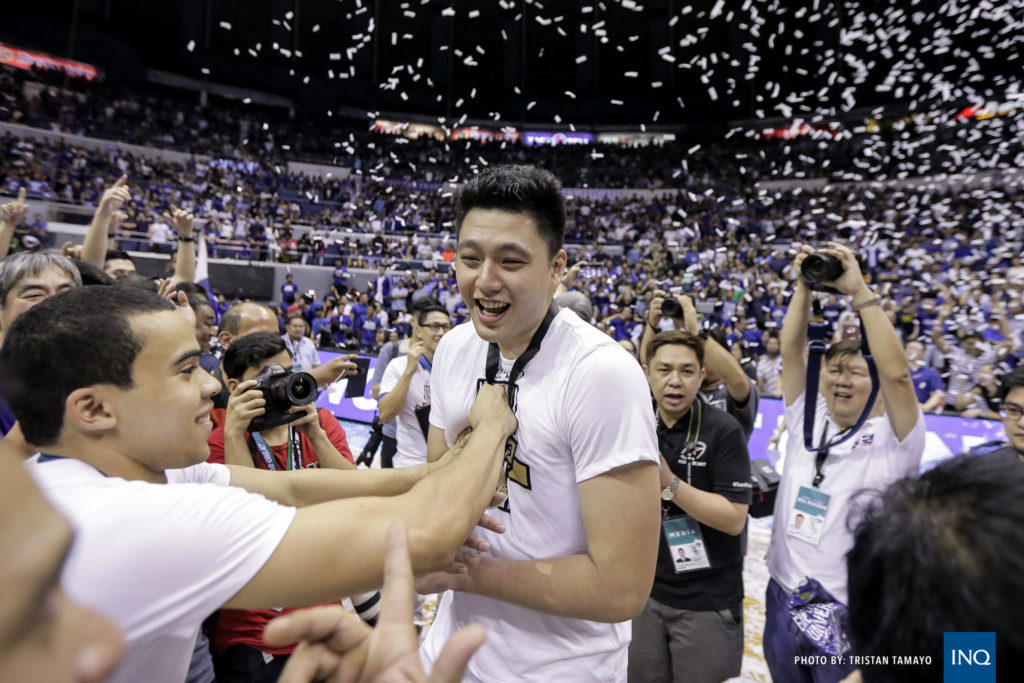Go for the win

Photo by Tristan Tamayo/INQUIRER.net
Boredom started to set in for a bunch of high school basketball stars who were holed up in a hotel for a regional tournament in Banting, Malaysia—a quiet town 41 kilometers away from Kuala Lumpur.
There wasn’t much to do for the young boys after a game.
Article continues after this advertisementBut Isaac Go, a member of that 2011 batch of the Philippine under-16 youth team, found a way to while away his time—he brought school work.
Go laughed at the memory.
“I think I was a pretty good, above average student,” he said. “I would say I’m a nerd, partly because I understand that basketball can only take you so far.”
Article continues after this advertisementLong before he turned into Ateneo’s season savior—many times over—and helped power the Blue Eagles to a UAAP championship, Go couldn’t even see himself flourishing in basketball.
“I wasn’t really into sports. I was more into acads (academics), or just really anything but basketball,” admitted Go. “So as a younger kid, I would probably laugh if I ever thought that I’d be where I am now. Just me playing for Ateneo—not even winning the championship—but just being able to play in college.”
“I think I was a little bit serious with basketball around high school, but I never really saw beyond that,” he added. “I never thought I would get into a college team and make a name for myself.”
Despite rapidly growing then to a height of 6-foot-4 at 15 years old, Go usually lumbered up and down the court, a tad soft and slow for most coaches’ liking. So when the national youth team came calling, Go was thrilled.
“I was surprised because I thought I was a nobody,” said Go. “The other players were making waves in high school and they were more known compared to me and I felt maybe I didn’t belong. But I just took the opportunity.”
Go joined a roster led by Far Eastern University’s Arvin Tolentino and Hubert Cani, La Salle’s Andrei Caracut and Prince Rivero, and NU’s J-Jay Alejandro.
FEU coach Olsen Racela, the national youth team mentor then, admitted he got Go on board for pragmatic reasons. “We invited him mainly because of his height. He was still very raw at that time but he was the tallest 15-year-old in the country,” said Racela. “Also, he’s from Xavier, a non-UAAP and NCAA team. It would be easier to get permission for him to play for the national team.”
Making the team already meant a lot for Go. So he didn’t mind being a benchwarmer: “It was a great confidence booster. It really pushed me because I saw that this is the level where I have to be. And I had to work harder to get to that level.”
The hard work was a surprise coming from someone who wasn’t that into the sport: “I hated basketball when I was young,” Go said.
And the early disappointments didn’t help. Go got cut in his first few try-outs in Xavier.
“He was always been the tallest guy in the team—even in school for that matter,” said older brother Gian, who had several fights with Go just to get him on the court. “However, to begin with, it was all just height. He was slow, he lacked the coordination and speed needed to play the game at that level but he’s always had the basketball IQ.”
That sharp mind impressed Ateneo coach Tab Baldwin. But the Kiwi-American mentor still saw a “big, fat kid.”
“Coach Tab told me, your skills are okay as it is now but your body has to catch up,” recalled Go, an Applied Chemistry major. Last year, Baldwin’s 6-foot-7 project started to shed off the pounds with a no-rice diet.
Playing in his third season, Go hit his stride. And Racela’s FEU was among the 21-year-old’s victims.
In the do-or-die semifinals, Go knocked in a triple that forced overtime, and later, a crucial putback while almost down on the floor that helped seal the win over FEU and sent Ateneo to a title showdown versus La Salle.
Go had more highlights in the finals, but none bigger than the dagger triple with 24.7 seconds left in Game 3 as the Blue Eagles dethroned the Green Archers, 88-86, to capture their first crown in five years.
“When you get those chances of being clutch, you’re just repaying your coaches and teammates’ trust in you,” said Go. “You’re repaying the work you’ve put in for yourself in the last 10 months or more. That one moment is just a culmination of everything.”